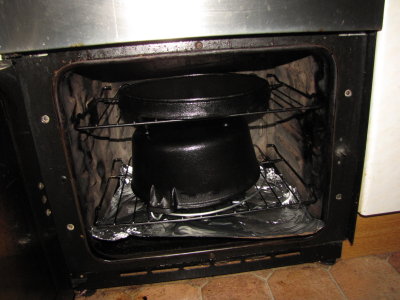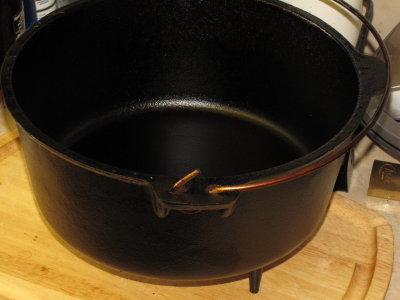A while ago I added to my cast iron cookware, and photographed the process I use to prepare them for use. Given a number of people just bought some of Ronnies (very good) cast iron, I thought it might be helpful to reproduce the instructions here. I'm sure many have done it before, but hopefully it'll help someone
The thing I like with cast iron is that if you ever damage the seasoning, just get it really hot in embers, knock off the old seasoning - and start again! I'tt still be good in 100 years - wonder how many Teflon pans will be?
Red
I have just bought a new 9 quart dutch oven (e-bay cheapy) and a small South African "bake pot" potjie. One was "allegedly" preseasoned, the other untreated.
This is the Dutch Oven

It got a nice dark colour - inside and out

Trouble is, the base is really rough - as it is on much cheaply cast stuff.

If you ever handle really good, old cast iron, the base is smooth as silk. Partly through good manufacturing, partly through wear, partly through the build up of "seasoning".
I want to accelerate that, so, out witht he detail sander

I like these for working on cast iron - they are curved and you can get right into the edge like this

Do stick a mask on - or you will be coughing black crud for a couple of days!

Work through the grits as any other sanding job - you'll notice the dust build up

When you have the inside nice and smooth, do the inside of the lid. You can use this for a skillet if you flip it over!
Then scrub the pan inside and out to remove any laquer apllied in the factory to prevent rust. I'm using a scourer here but if "topping up" seasoing use a nylon pad to prevent scratching

Dry well to prevent any rust

Stick your oven on to 250C (HOT) and preheat. I line the bottom with tinfoil to catch drips.

Cover you pan with a THIN coat of oil. This is like painting - many thin coats is the key. You can use lard or bacon fat but warm the pan first so the fat melts and runs. Use a lint free cloth to distribute the oil.

Put the pan and lid in the oven upside down so that excess oil drips out. Bake for an hour. Open all the doors and windows as this is going to smoke a LOT. You can do this in a fire or barbecue if you have a less understanding partner.

After an hour use oven gloves to remove the pan and lid. Put on a heat proof surface and leave to cool. Then apply another thin coat and bake for another hour. Several coats are needed. This sequence shoudl show the coats building





Thats it really - leave to cool well and then use for frying bacon and the like for a few times - it improves the seasoning
The thing I like with cast iron is that if you ever damage the seasoning, just get it really hot in embers, knock off the old seasoning - and start again! I'tt still be good in 100 years - wonder how many Teflon pans will be?
Red
